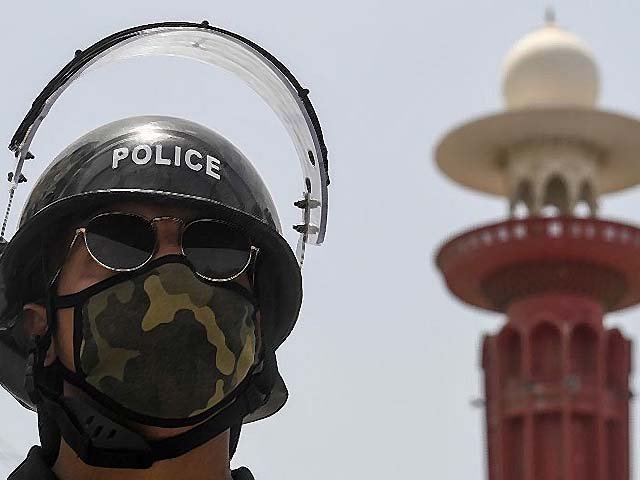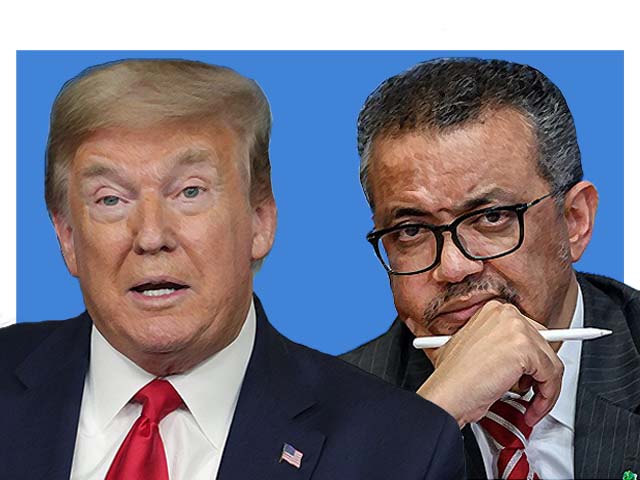
Donald Trump shakes hands with Russia’s President Vladimir Putin as they pose for a group photo ahead of the Asia-Pacific Economic Cooperation Summit in Da Nang, Vietnam on Nov. 10, 2017. PHOTO: GETTY
Is Trump’s secret relationship with Putin the only thing preventing another Cold War?
If the allegations of Trump’s collusion are at all true, it could be the only silver lining in the current situation.
The world order these days feels more like a throwback to the Cold War era, as the UK and its allies take diplomatic action against Russia for its alleged role in the nerve toxin poisoning of a Russian double agent, Sergei Skripal, and his daughter, Yulia. The UK’s western allies – especially the European Union (EU), the US, and members of NATO – have shown solidarity with London, expelling dozens of Russian diplomats.
Skripal, a former Russian spy, was accused of selling Russian secrets to Britain, and was hence jailed. It was in 2010 that he, along with his daughter, went to Britain in a spy swap between the two countries. Though Russia denies attacking him – citing his irrelevance to Moscow – Vladimir Putin’s critics, on the other hand, feel this is a warning for any other spies trying to betray Russia in the future.
Unsurprisingly, Moscow has retaliated against its diplomat-shaming with like-for-like numbers. A statement from the Kremlin stated the country would expel 60 US diplomats – exactly the same number of Russian diplomats kicked out of the US – coupled with a number of others from countries that joined hands with the UK. It now stands at a total of 150 Russian diplomats leaving 27 countries, making it one of the largest coordinated acts against Russian espionage since the end of the Cold War.
These combined actions against Russia have led its ambassador to Australia to state that the current situation could drive the world into a ‘Cold War situation’.
What is surprising, however, is that Russia’s response seems a bit measured, as it has primarily targeted only the UK and the US in all of its statements, and hence avoided a tussle with other European countries.
The US government’s actions, on the other hand, have come as a surprise, especially since President Donald Trump is alleged to have some ‘affinity’ for his Russian counterpart. Trump not only congratulated Putin on his recent electoral victory, despite strong advice not to do so, but he also failed to criticise him in any of his recent addresses. Ironically, even the Russian state media and politicians are adamant Trump is Moscow’s friend, and has been pressurised by Russia’s enemies and the American ‘deep state’ to expel diplomats.
In a similar vein, Russia has downplayed the nerve-gas attack, calling it a propaganda campaign orchestrated by the UK and the US to defame Moscow. However, as things stand, the Russian government has thus far failed to convince the world that it had no role in the attack. Another fact going against Russia’s denial is the use of a novichok – a nerve agent developed by the Soviet Union, with stockpiles maintained by Russia, and complicated enough to only be weaponised by state actors.
This diplomatic crisis and grandstanding has all the potential of snowballing into an East-West crisis. Putin thrives on such grand acts from the West, using them to promote his nationalistic posture domestically. This ‘us versus them’ discourse has placed him as the only viable leader for the country in the minds of the Russian people. With Russia already locking horns with the US in Syria, any escalation of conflict could lead to serious regional repercussions and proxy wars.
Putin’s new military doctrine – involving a limited nuclear war, using pre-emptive nuclear strikes – also rings alarm bells for countries wanting to engage in any sort of a conflict with Moscow. On top of that, the Russian media has also reported that the country conducted its first military aircraft training flight from the North Pole to North America since the Cold War. However, it is hard to determine if this has any connection to Moscow’s standoff with the West.
Irrespective of correlations, one thing is for certain: even an economically weak Russia possesses an ever-growing strong and conventional military capability. A confrontation, in this situation, is only a recipe for disaster.
The United Nations (UN) Secretary-General, Antonio Guterres, also voiced his concerns on the current crisis, admitting he believes this deteriorating situation is,
“similar, to a large extent, to what we lived during the Cold War.”
Such statements, coming from the head of the UN, should most definitely create some anxiety. However, if the allegations of Trump’s collusion and affinity with Russia are even marginally true, this might be the only silver lining in the current situation. Ironically, irrespective of Trump’s lack of leadership abilities and political acumen, his covert relationship just might help averting yet another full-blown and long-drawn confrontation between Russia and the West.




COMMENTS
Comments are moderated and generally will be posted if they are on-topic and not abusive.
For more information, please see our Comments FAQ